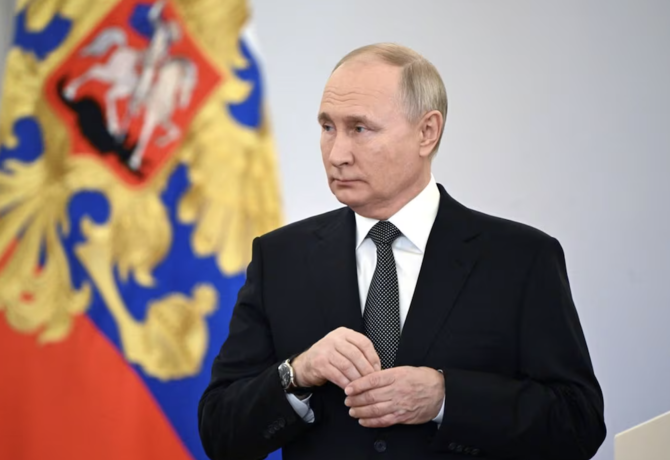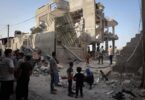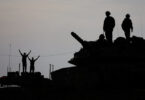Dalia Al-Aqidi
Since the outbreak of hostilities on Oct. 7, when Hamas attacked Israel, the global spotlight has been fixated on this conflict. International media outlets have devoted the lion’s share of their coverage to this confrontation between a recognized terrorist organization and a sovereign nation. Regrettably, this intense focus on the Israel-Hamas conflict has inadvertently cast a shadow over other global crises, particularly the ongoing war in Ukraine. This diversion of attention has afforded Russia a strategic opportunity to advance its expansionist agenda in Ukraine with minimal international scrutiny.
For the first time since Russia launched its invasion of Ukraine in February last year, the Kremlin has successfully cultivated an aura of potential victory. This stark departure from the conflict’s earlier outlook underscores the effectiveness of President Vladimir Putin’s strategies. Among these strategies was placing Russia on a war footing: a move that has consolidated his hold on power within the nation.
Furthermore, Putin has adeptly procured military resources and equipment from international sources, significantly bolstering his country’s military capabilities. These actions emphasize not only the Russian president’s unwavering commitment to sustaining the conflict, but also his ability to secure critical assets from global suppliers, often through audacious means.
Putin has been waiting for a chance to expand his influence and undermine Western convictions. Beyond military maneuvers, Russian officials have embarked on a calculated campaign to garner support from nations in the Global South. This diplomatic offensive has effectively sown seeds of opposition and discontent against the US, while undermining the international coalition that is critical of Russia’s actions in Ukraine.
Arguably, the most profound implication of Russia’s recent moves lies in its relentless efforts to undermine prevailing convictions in the Western world. The consensus among Western nations is that Ukraine possesses the potential and the imperative to emerge from the ravages of war as a flourishing European democracy. But Moscow’s actions have cast doubt on this belief, challenging the West’s determination to support Ukraine’s post-conflict transformation and potentially altering the entire narrative of the conflict.
In essence, the dynamic landscape of the Ukraine-Russia conflict has evolved significantly since its inception, with Russia’s recent actions and strategies reshaping the geopolitical and strategic landscape of the region. This, in turn, has had an impact on global perceptions and alliances.
Ukrainian President Volodymyr Zelensky last month candidly acknowledged that Russia was “controlling the skies” over Ukraine and urgently requested US-made F-16 warplanes and advanced anti-aircraft defenses to alter the situation. However, questions loom about whether the US would be willing to provide such crucial assistance.
Things have not been easy for the Biden administration. In a letter addressed to Mike Johnson, the new Republican Speaker of the House of Representatives, and other congressional leaders, White House budget director Shalanda Young expressed concerns about the diminishing resources available to support Ukraine in the ongoing war. She wrote: “I want to be clear: without congressional action, by the end of the year we will run out of resources to procure more weapons and equipment for Ukraine and to provide equipment from US military stocks … There is no magical pot of funding available to meet this moment. We are out of money — and nearly out of time.” Johnson gave the letter a cold response, expressing concerns about Ukraine’s lack of a clear strategy.
Congress has previously approved more than $110 billion for Ukraine’s war effort. However, no additional funds have been allocated since the transition of power in the House of Representatives from Democrats to Republicans in January.
Had Ukraine received the comprehensive support it currently enjoys from the onset of the conflict, the war might have taken a substantially different course. During the early stages of the conflict, Ukraine grappled with the challenge of defending its territorial integrity and sovereignty against a well-equipped and formidable adversary. At that time, the level of assistance and resources at Ukraine’s disposal was comparatively limited, making it difficult to counter the military might and strategic prowess of opposing forces.
Unfortunately, the diversion of global attention has played directly into Russia’s hands. With the world’s gaze fixed on the Israel-Hamas conflict, it has seized the opportunity to advance its expansionist ambitions in Ukraine with significantly reduced international scrutiny. Moscow has been able to continue its hostilities and atrocities against Ukrainians with relative impunity as the global spotlight remains diverted, likely giving Putin and his troops a solid boost to continue to ignore the international community.
Meanwhile, concerns are intensifying within the corridors of power in Washington, where apprehensions abound that Putin may be strategically inclined to bide his time until the next presidential election in November 2024. This vote is likely to bear a striking resemblance to the electoral showdown witnessed in 2020 between then-incumbent President Donald Trump and Joe Biden. This apprehension is grounded in the recognition that a pending presidential election often dominates the country’s political landscape, drawing substantial attention, resources and decision-making capacity away from international crises.
Shrewd tactician Putin, who is a former KGB officer, might perceive this as an opportune moment to maintain a holding pattern, capitalizing on the potential distraction of the election to further advance his objectives in Ukraine.
With its high stakes and divisive nature, the historical precedent of the 2020 election serves as a poignant reminder of how the domestic political calendar can influence America’s ability to respond decisively to global challenges. Consequently, the forthcoming election year looms large in discussions about the trajectory of the Ukraine-Russia conflict and Putin’s calculated patience.







